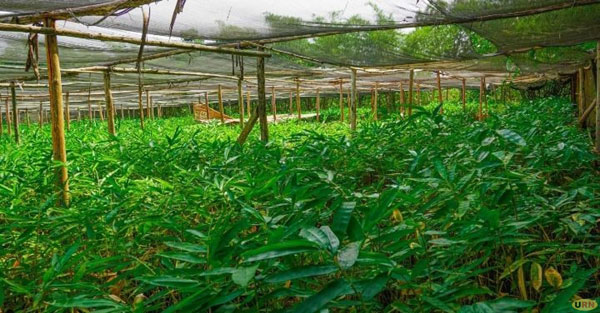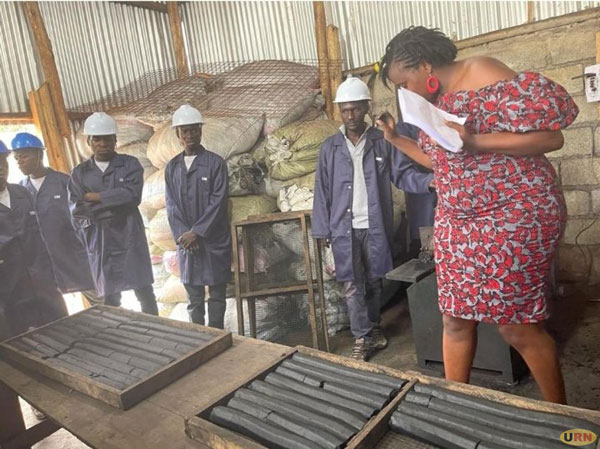
Kampala, Uganda | THE INDEPENDENT | Divine Nabaweesi abandoned her real estate business to venture into bamboo growing and processing it into various types of handicrafts. Seven years later, at her Divine Bamboo Group Ltd (DBGL) based at Najjeera in Kira Municipality, Wakiso District is part of the sustainable energy industry in Uganda, as she hopes to use bamboo products to help curb the charcoal trade and its effects.
The business founders went into environmental protection-related ventures seven years ago, but then zeroed in on Bamboo, after realizing it has more benefits than most of the tree species that could be farmed in Uganda. One of the reasons was that it was easy to grow anywhere in Uganda, with the different species thriving in different parts of the country.
James Kyewalabye, the group managing director, says they also realized that it would get the support of communities because of the social benefits it had, including nutrition, sustainable source of firewood, and crafts that communities could easily produce.
The company says they hope in the long run to see an African Continent with zero deforestation while utilizing bamboo resources to create alternatives to energy needs. Currently, more than 90 percent of Ugandans depend on firewood and charcoal for heating, while this is 100 percent in the rural areas, which, according to national figures, leads to the destruction of 200 hectares per year.
Kyewalabye says that unlike other programs and green energy projects, theirs is a sustainable value chain with the products being produced from the raw materials that they grow. He says hundreds of small-scale farmers have been contracted while the company also is establishing its own bamboo forests.
For the last three years, DBGL, which was established in 2016, has been developing a briquette with the help of technical experts, with the aim of ensuring it answers the concerns of the market over the existing products. Now, after the testing piloting the briquettes, Kyewalabye says that, at 50,000 shillings for a 50-kilogram pack, their product is actually 30 percent cheaper than the others on the open market. This, he says, will enable more Ugandans to embrace briquette use instead of the traditional charcoal.

Divine Bamboo has set out expansion plans to increase its production capacity of briquettes from 240 tonnes currently to 2400 tonnes annually in ten years. To achieve these goals, the company plans to scale the availability of raw materials by establishing 5,000 acres of bamboo plantations as well as engaging 5,000 smallholder farmers in the next five years.
Divine Bamboo also plans to scale the capacity of the nurseries from the production of seedlings production from 200,000 seedlings currently to 1,000,000. Nabaweesi, the founder and Chief Executive Officer, says they are now ready for expansion after securing land in Luwero District where their factory will be relocated and expanded.
Bamboo acts as a valuable sink for carbon dioxide storage, and on average, one acre absorbs 6.9 tonnes of carbon per year. The company expects that the production of 2400 tonnes of briquettes will save the cutting down of 8,000 tons of wood thereby saving an equivalent number of trees.
“Therefore, by saving over 8,000 trees annually the project will enable the absorption of over 2000 tonnes of CO2 annually by the 10th year.”
It is also expected that the use of over 2,400 tons of briquettes that DBGL will produce will contribute towards the emission reduction of over 14,000 tonnes of CO2 annually in ten years. Nabawesi says that this solution and model will also go a long way in enabling the rural communities to heed government calls against the charcoal trade because it offers an alternative economic solution.
She noted the challenges that small players in the sustainable energy sector are facing, as mainly the lack of access to financing, which is mainly due to a lack of information about the available sources.
The Ministry of Energy and Mineral Development, for example, has set aside 65 million dollars (more than 200 billion shillings) for private-sector energy entrepreneurs to access. Justine Akumu, Senior Energy Officer at the ministry says it is now even easier for small and medium enterprises to access money, under the Electricity Access Scale Up project, a five-year project.
She says the project also has an aspect for support to briquette production under the clean cooking section, to enable investors to acquire gadgets, technology, and other support.
The Worldwide Fund for Nature, WWF, is one of the global organizations that mobilize funds for the protection of wildlife and the preservation of nature. According to Yona Turinayo, Energy and Climate Programme Coordinator and WWF Uganda, there is a need for innovators in the energy sector as well as the government to promote products that poor communities can easily embrace. Turinayo revealed that they have created a credit financing program for SMEs managed by microfinance institutions, where investors can acquire credit to finance sustainable energy products.
The International Bamboo and Rattan Organisation (INBAR) also said they have specific programs for supporting the production of briquettes from bamboo. The Administration Assistant INBAR Uganda said they are also working with other organisations like the Food and Agriculture Organisation, to develop industry-specific policies that will help bamboo growers and processors access government services and financing better.
*****
URN
 The Independent Uganda: You get the Truth we Pay the Price
The Independent Uganda: You get the Truth we Pay the Price


